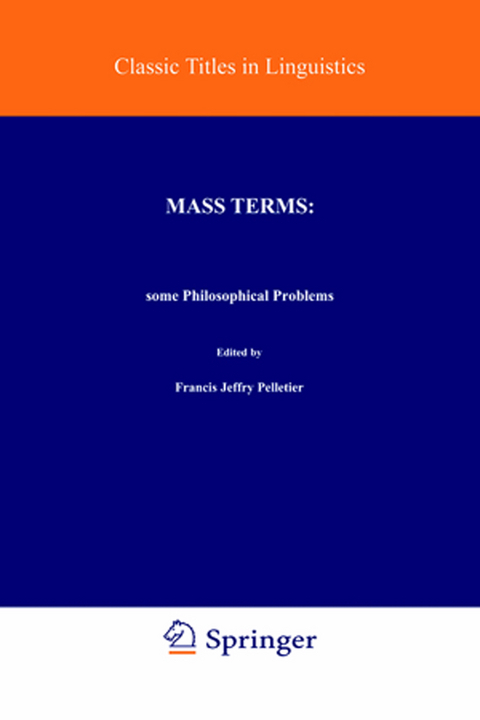
Mass Terms: Some Philosophical Problems
Seiten
2005
|
Softcover reprint of the original 1st ed. 1979
Springer-Verlag New York Inc.
978-1-4020-3265-3 (ISBN)
Springer-Verlag New York Inc.
978-1-4020-3265-3 (ISBN)
MASS TERMS, COUNT TERMS, AND SORTAL TERMS Central examples of mass terms are easy to come by. Semantically, philo sophers have characterized count terms as denoting (classes of?) indi vidual objects, whereas what mass terms denote are cumulative and dissective.
I. MASS TERMS, COUNT TERMS, AND SORTAL TERMS Central examples of mass terms are easy to come by. 'Water', 'smoke', 'gold', etc. , differ in their syntactic, semantic, and pragmatic properties from count terms such as 'man', 'star', 'wastebasket', etc. Syntactically, it seems, mass terms do, but singular count terms do not, admit the quantifier phrases 'much', 'an amount of', 'a little', etc. The typical indefinite article for them is 'some' (unstressed)!, and this article cannot be used with singular count terms. Count terms, but not mass terms, use the quantifiers 'each', 'every', 'some', 'few', 'many'; and they use 'a(n)' as the indefinite article. They can, unlike the mass terms, take numerals as prefixes. Mass terms seem not to have a plural. Semantically, philo sophers have characterized count terms as denoting (classes of?) indi vidual objects, whereas what mass terms denote are cumulative and dissective. (That is, a mass term is supposed to be true of any sum of things (stuff) it is true of, and true of any part of anything of which it is true). Pragmatically, it seems that speakers use count terms when they wish to refer to individual objects, or when they wish to reidentify a particular already introduced into discoursc. Given a "space appropriate" to a count term C, it makes sense to ask how many C's there are in that space.
I. MASS TERMS, COUNT TERMS, AND SORTAL TERMS Central examples of mass terms are easy to come by. 'Water', 'smoke', 'gold', etc. , differ in their syntactic, semantic, and pragmatic properties from count terms such as 'man', 'star', 'wastebasket', etc. Syntactically, it seems, mass terms do, but singular count terms do not, admit the quantifier phrases 'much', 'an amount of', 'a little', etc. The typical indefinite article for them is 'some' (unstressed)!, and this article cannot be used with singular count terms. Count terms, but not mass terms, use the quantifiers 'each', 'every', 'some', 'few', 'many'; and they use 'a(n)' as the indefinite article. They can, unlike the mass terms, take numerals as prefixes. Mass terms seem not to have a plural. Semantically, philo sophers have characterized count terms as denoting (classes of?) indi vidual objects, whereas what mass terms denote are cumulative and dissective. (That is, a mass term is supposed to be true of any sum of things (stuff) it is true of, and true of any part of anything of which it is true). Pragmatically, it seems that speakers use count terms when they wish to refer to individual objects, or when they wish to reidentify a particular already introduced into discoursc. Given a "space appropriate" to a count term C, it makes sense to ask how many C's there are in that space.
Non-Singular Reference: Some Preliminaries.- Some Bits and Pieces.- Some Remarks about Mass Nouns and Plurality.- The Indeterminacy of Mass Predication.- Sharvy on Mass Predication.- Four Ontologies.- On the Adequacy of a Type Ontology.- Theories of Matter.- On the Usefulness of Quantities.- An Analysis of Mass Terms and Amount Terms.- Afterthoughts on Mass Terms.- The Proper Treatment of Mass Terms in English.- Amounts and Measures of Amount.- Mass Terms, Count Nouns, and Change.- Stuff and Things.- Quantity and Quantification.- Sameness and Individuation.- Ensembles and the Formal Semantic Properties of Mass Terms.- Predication and Matter.- A Bibliography of Recent Work on Mass Terms.- Index of Names.- Index of Subjects.
| Erscheint lt. Verlag | 4.4.2005 |
|---|---|
| Reihe/Serie | Studies in Linguistics and Philosophy ; 6 |
| Zusatzinfo | XIII, 305 p. |
| Verlagsort | New York, NY |
| Sprache | englisch |
| Maße | 148 x 210 mm |
| Themenwelt | Geisteswissenschaften ► Philosophie ► Sprachphilosophie |
| Geisteswissenschaften ► Sprach- / Literaturwissenschaft ► Sprachwissenschaft | |
| ISBN-10 | 1-4020-3265-X / 140203265X |
| ISBN-13 | 978-1-4020-3265-3 / 9781402032653 |
| Zustand | Neuware |
| Haben Sie eine Frage zum Produkt? |
Mehr entdecken
aus dem Bereich
aus dem Bereich
Macht und Legitimität politischer Sprache im Prozess der europäischen …
Buch | Softcover (2023)
Nomos (Verlag)
CHF 103,60
KI, Kreativität und algorithmische Postrationalität
Buch | Softcover (2024)
Matthes & Seitz Berlin (Verlag)
CHF 23,90
Wie die Menschheit zu ihrer größten Erfindung kam
Buch | Softcover (2022)
C.H.Beck (Verlag)
CHF 25,20


